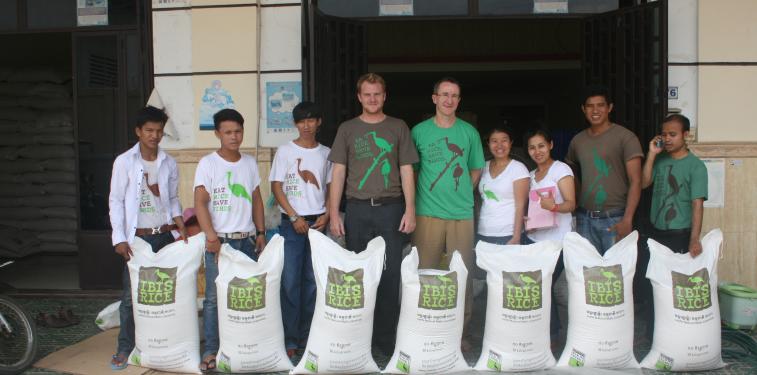“We ate sitting on a big piece of cardboard on the warehouse floor. Work-wise, there is a lot to do; competing priorities, wants and no plan. It’s my job to sift through it all and develop a plan.”
So began Phillip Barrow’s blog on the first day of a 10-week assignment in Cambodia in 2015, arranged by Accounting for International Development. From a tiny office outside central Phnom Penh, he went to work using his professional skills philanthropically to develop the financial structures for Ibis Rice.
The project is built around producing and selling the highest quality organic, fragrant jasmine rice and paying farmers a premium for wildlife-friendly farming. It is named after the giant ibis bird, believed extinct until its rediscovery in 1993 and still critically endangered due to habitat destruction.
For Barrow, Ibis Rice is a conservation program delivering real and demonstrable social outcomes. “In the conservation world, Ibis Rice is about protecting endangered species,” he says. “In my world, it is about protecting species and raising living standards among Cambodia’s rural poor.”
During the volunteer period, Barrow developed systems and trained local staff to understand how Ibis Rice was trading, produce monthly reports, prepare forecasts and recognise and face issues as they arose.
“It engages the local community in something they already do,” he says.
“You could see light bulbs going on as people started to understand the systems and processes.”
Being dependent on government or donors is a precarious situation in the non-governmental organisation (NGO) world, so Barrow prepared a business plan to take the organisation from donor-reliant to break-even in two years.
“When you work in the NGO sector, your program is of interest until something new comes along,” he says.
“We want Ibis Rice to be sustainable.”
Barrow returned to Cambodia for a week last August, then took up a new role back in Sydney as GPT Group’s head of development finance. He continues to remotely support the Ibis Rice team, communicating each month with them. Another trip is on the cards for mid-2016.
“I have built a real connection with Cambodia,” he says.
“It’s a developing country with a rich history and people who are friendly, welcoming and eager to learn. I work with people I admire and respect, and my ongoing support is a way to ensure the project continues to build local capacity.
“Being a volunteer has given me a real sense of how we, as accountants and business people, can add value. It’s an incredibly fulfilling program; you can see the added value and real outcomes. I’m very fortunate to be part of Ibis Rice.”
The Cambodian Project
Accounting for International Development offers accountants the opportunity to use their skills to support a broad range of not-for-profit organisations globally. The main focus is to develop and enhance the skills, confidence and potential of local people to deliver more effective and sustainable programs.
Sansom Mlup Prey Cambodia is a not-for-profit, conservation enterprise founded in 2009. Working with farmers in protected forests in Cambodia’s northern plains, the Ibis Rice project aims to increase incomes for poor, rice-growing households, protect 500,000 hectares of forest and wetlands and conserve many endangered animal species.
This article by Lisa Ratcliff appeared in the April edition of CPA Australia’s InTheBlack magazine.
